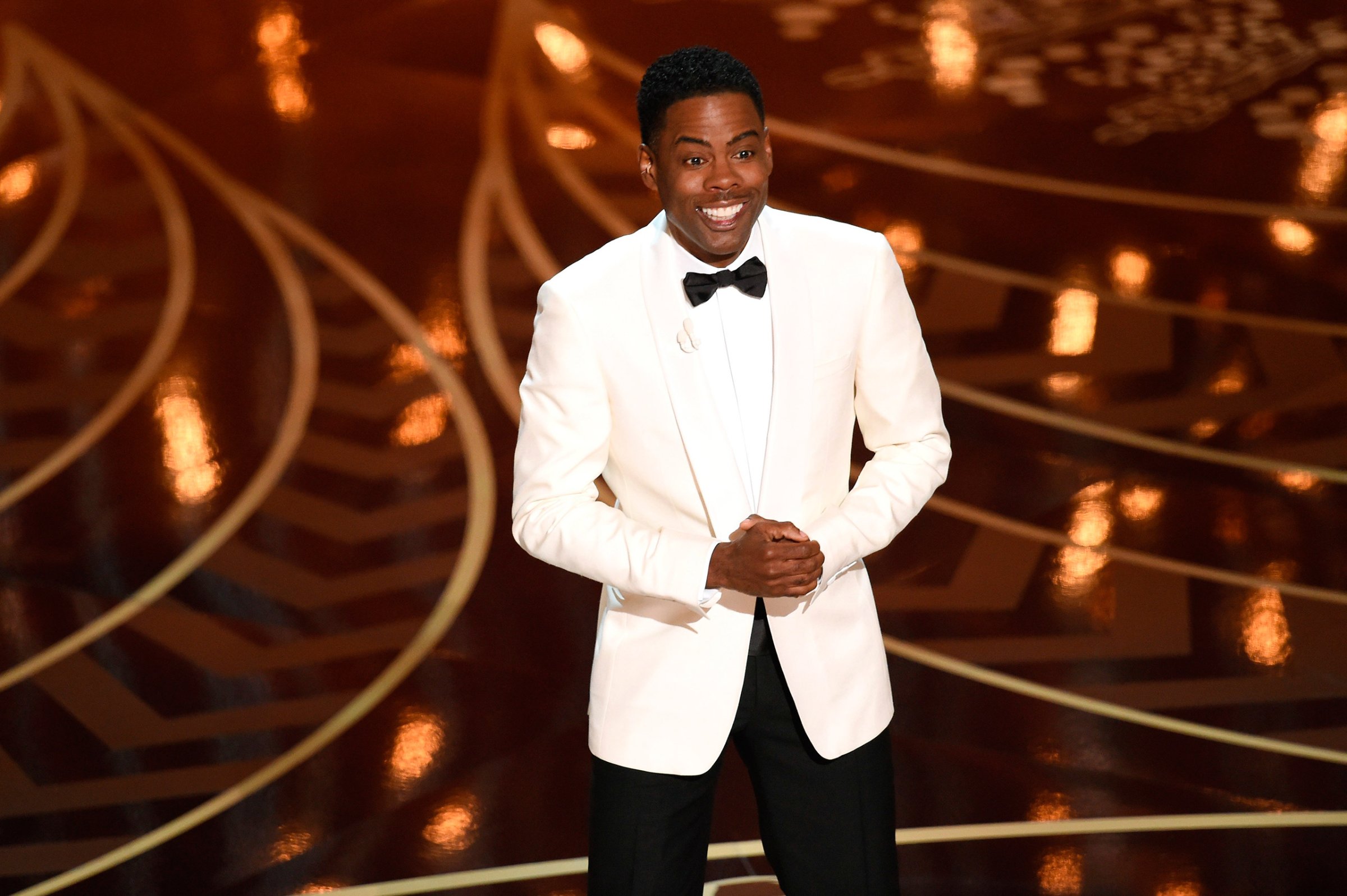
All too often, a host disappears from the Oscars ceremony after their monologue is done. This year’s ceremony, though, was defined more by its host than by any of the winners. It was better for it.
Chris Rock’s second hosting gig, after a 2005 bit that raised hackles, began with an incandescent bit of freewheeling humor that took even fewer prisoners than Rock fans might have expected. In his first moments onstage, Rock made fun of the previous year’s disengaged and clueless host, Neil Patrick Harris (noting Harris would be the mediocre choice available if the Academy’s largely white membership had a vote); over the next 10 minutes, Rock proved his point, making clear he was exactly the host the Oscars needed in a tenuous moment.
Rock making fun of the Academy itself for, two years in a row, nominating only white actors in all 20 available slots? That was easy to predict, given widespread public annoyance over the nominees’ list. And Rock’s voiced notion that Hollywood is “sorority racist” (the sort of insidious racism that just indicates one can’t sit with us) was beautifully delivered. But Rock went yet harder. “This year, in the in memoriam package,” Rock quipped, “it’s just going to be black people who were shot by the cops on their way to the movies.” It stung, and it deserved to.
The show’s most intriguing subplot may have been Rock’s annoyance at Will Smith’s declared boycott of the telecast. Smith, joined by this year’s honorary Oscar winner Spike Lee, stood relatively alone as an absentee. Presenters of color onstage included everyone from past winner Whoopi Goldberg (who also appeared in a sharp, clever bit about what nominated films might have looked like with nonwhite actors included) to Quincy Jones.
And so Rock’s elaborate takedown of Smith provided an intriguing flavor to the broadcast, beginning with noting that “unemployed people” are always the ones telling you to quit your job and mocking Jada Pinkett Smith’s paucity of film roles, and going on to include a lampoon of Smith’s accent in non-nominated film Concussion. A post-monologue segment in which no less an eminence than Oscar nominee Angela Bassett pretended to be honoring Will Smith for Black History Month, then revealed all of the descriptors she was rattling off were meant to apply to Kung Fu Panda star Jack Black, was the high-water-mark of pettiness.
Was it deserved? Well, when it comes to the fun that can come from celebrity rivalry—especially the sort that can be dissected for years to come—does it matter? Smith, twice nominated for Best Actor, is a part of Oscar history. Chris Rock reverted back to earlier Academy history, finding humor in antagonism in a manner that fit the pieced-together nature of the evening’s broadcast. For so many years, the Oscars had felt too smooth; the biggest problem with Harris’s hosting gig last year was his rigid adherence to the puns he’d prescripted. Rock’s Oscars felt gloriously messy in the manner of Oscar ceremonies from years ago, long before slickness became a requirement.
There’s no particular reason that this year’s Oscars ought to have been special, and yet the messiness of the broadcast made it stand out from past shows. The Vice-President of the United States appearing to introduce a song that ended up losing the Best Original Song Oscar—to a mediocre-if-tuneful Bond theme, at that. The low angle on each of last year’s acting winners as they announced this year’s, as if to find the least flattering way to frame them. The bizarre and almost incoherent appearance of beloved robot star C-3PO on the stage, whose complete absence of purpose recalled Harris at his worst moments last year. A governing spirit of Why not? made each of these violations of the viewers’ time feel like a journey, one that culminated in a surprise winner for Best Picture (Spotlight, which had picked up only one other award). Rock had a very difficult task ahead of him as host, and the viewers felt every bump.
As for Rock himself, his hosting basically fell apart after the monologue, in exactly the manner all hosts’ do. But Rock really kept at it! He lost the room, and the audience at home, with the ushering out of Clueless actress Stacey Dash; it was a misbegotten, though well-meaning, commentary on social justice that even this viewer (who’s well aware of Dash’s reputation as a conservative commentator) didn’t quite get. After an unusually assured monologue, Rock seemed dependent on stunts like this, from a Girl Scout cookies-hawking bit borrowed wholesale from Ellen DeGeneres’ pizza-delivery stunt two years prior (which wasn’t that interesting the first time) to a snide joke about nominated lesbian drama Carol as a “girl-on-girl film.”
But that’s the risk you take when you bring on an agent of chaos. Rock was hired long before the nominees list was announced, or even assembled. That his act might come across as too chaotic for some ears was a risk worth taking, and the degree to which it addressed what is wrong about the Oscars was worthwhile in itself. It’s tempting to hope that Rock will become the sort of Oscar host, like Billy Crystal or Bob Hope, who comes back year after year. But it’s a better thing to hope for, whether or not he comes back, that we won’t need him so urgently ever again.
More Must-Reads from TIME
- Donald Trump Is TIME's 2024 Person of the Year
- TIME’s Top 10 Photos of 2024
- Why Gen Z Is Drinking Less
- The Best Movies About Cooking
- Why Is Anxiety Worse at Night?
- A Head-to-Toe Guide to Treating Dry Skin
- Why Street Cats Are Taking Over Urban Neighborhoods
- Column: Jimmy Carter’s Global Legacy Was Moral Clarity
Contact us at letters@time.com